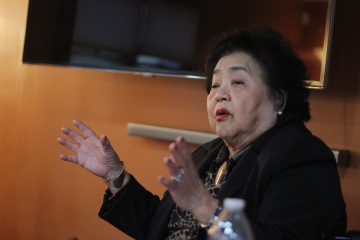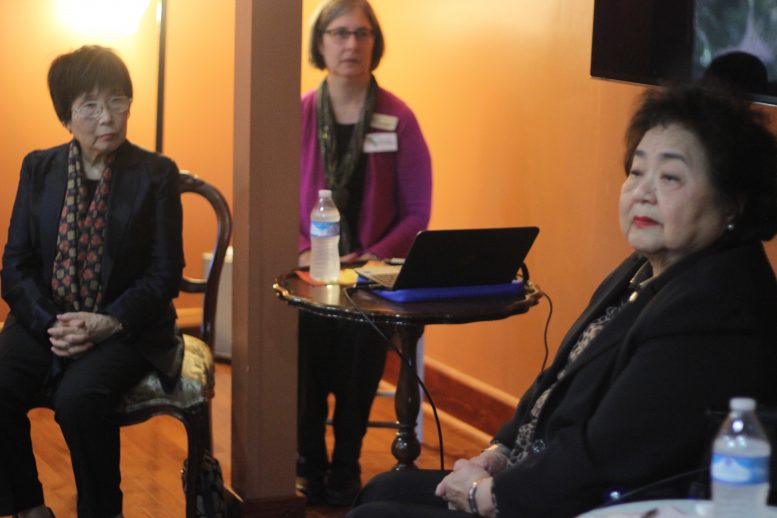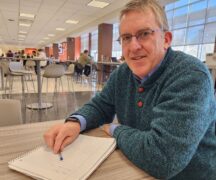By DAVID DUPONT
BG Independent News
Hiroshima bombing survivor Keiko Ogura punctuated her account of the day the nuclear bomb destroyed her city and killed 80,000 instantly, with a simple phrase: “It happened.”
It was as if on a beautiful autumn day in Bowling Green, the horrors of another beautiful day, Aug. 6, 1945, would be so unbelievable and needed confirmation.
“It happened.” Bodies washed out to sea coming back. Pregnant women who went to the city to seek their husbands, gave birth to deformed infants months later. In a small park near her home, her father created 700 bodies.
A sudden flash, silence, darkness descending and a charcoal rain. “It happened,” Ogura said
Ogura, an educator at the Hiroshima Peace Memorial, and Setsuko Thurlow, also a Hiroshima survivor and nuclear disarmament advocate, spoke at the Wood County Library’s Carter House on Thursday. Their presentation was part of “Seeking Peace in the Nuclear Age: A Peace Symposium” presented at Bowling Green State University.
Akiko Jones, who organized the symposium, credited Dr. Marc Simon, a colleague in the Peace and Conflict Studies program, with suggesting hosting an event in the community as well as on campus.

Setsuko Thurlow
After the two survivors had spoken, Simon said that all his university students have learned about the bombing of Hiroshima and later Nagasaki was that it shortened the war.
While the Holocaust is taught in detail and rightfully sparks moral outrage, little thought is given to the horrors of nuclear war.
Simon said he felt that was because the United States is seen as on the side of good in liberating concentration camps while they were the perpetrators of the atom bomb.
Local resident Sue Moore said she never understood how the suffering in Hiroshima could be justified.
Thurlow and Ogura detailed that suffering. Ogura illustrated her talk with paintings inspired by her story done by high school students. It took some students a year to complete their paintings because of the emotional impact of her story.
Ogura was 8 at the time while Thurlow was 13.
In the weeks before the attack “we were living in fear and anxiety,” Thurlow said.
The United States had started a campaign of carpet bombing Japanese cities, yet Hiroshima, the 10th largest, had been spared, she said.
Ogura said months before the attack, her father had moved the family out of the city to the nearby countryside. He said that Hiroshima was going to be attacked soon.
What people couldn’t know, Thurlow said, is why Hiroshima had been spared. Once the atomic bomb had been successfully tested, the reasoning was, she said, “instead of using this new type of bomb on already burned-out city we’d like to use it on a city that’s not been touched.”
Thurlow was at Army headquarters the day the bomb was dropped. She and other school girls had been enlisted to do decoding for the military. This was to be their first day of work. They were marched up to the second floor of the building and given a pep talk. Now was the time to show their patriotism, they were told. “Do your best for the emperor.”
And they responded “Yes, we will!”
At that instant Thurlow said she saw the bluish-white flash. “My body flew up in the air,” she remembers. “I still have that sensation.”
When she regained consciousness she was buried in rubble, and thought she would die. She was strangely calm. Around her classmates called out to God and their mothers.
Then someone started working to free her. She crawled toward the light in the opening. Behind her the building started burning. She could not go back to rescue anyone else. The sky was dark with dust and particles. Outside soldiers told her and two others freed from the rubble to join a group moving toward them.
“I could hardly tell they were human beings,” Thurlow said. “They looked like ghosts to me.”
They were missing limbs. Their skin was blackened, swollen, and hanging from their bones. Some would fall and their stomachs would burst open.
“As ordered we join the ghostly procession,” Thurlow said. They headed for a nearby hill, stepping over dead bodies along the way. More dead bodies were awaiting them at the army installation at the foot of the hill.
She and her friends were “lightly injured.”
The severely injured lacked the energy to scream. All they could do was murmur requests for water. The three girls had no containers, but they went to a stream. Cleaned up, and the ripped their blouses.
They soaked those in the water, then returned to the wounded. “We put the cloth over the mouths of those people who desperately sucked out the moisture. They looked into our eyes and said ‘thank you’ and that was the end of their lives.”
The girls continued this all day, and at night sat with others on the hill and watched the city burn.
The next day her parents found her, and they went to the place that had been their summer home. Thurlow’s sister and her 4-year-old son were there. They’d been crossing a bridge were completely exposed when the bomb hit. Both were severely injured and died after four days of suffering.
Then soldiers came, dug a hole, threw the corpses in and cremated them. As they did, Thurlow said, they made coarse comments.
“They were treated like insects.”
Yet she said, she didn’t even cry. Later she would wonder what kind of person she was to have felt nothing watching such horror.
Later psychiatrist Robert Jay Lifton gave a name to what she suffered she said, “emotional cessation.”
If she’d reacted emotionally to all the terror around her, she said, she never would have survived.
But she did. Thurlow watched and was inspired by other survivors who worked tirelessly to help the victims and rebuild the city.
“I wanted to be like them,” she said.
So she studied psychology and became a therapist, and she also began educating others on the dangers of nuclear war and advocating for nuclear disarmament.
She concluded her talk with “glorious news.”
The organization she works with ICAN (the International Campaign to Abolish Nuclear Weapons) had been central to a push to have the United Nations adopt a treaty calling for nuclear disarmament this summer. Now it needs 50 signatories.
Thurlow said the nuclear powers have failed in their obligation to work toward disarmament under the terms of the Nuclear Non-Proliferation Treaty.
To have the United Nations act is a victory, though none of the nuclear-armed nations support it. Still the treaty was adopted. “It actually happened,” Thurlow said.
“So great things are happening,” she said. “We have to keep the momentum. Now you’ve heard the truth. Now don’t leave it alone. Now join the pushing and work with your government.”


